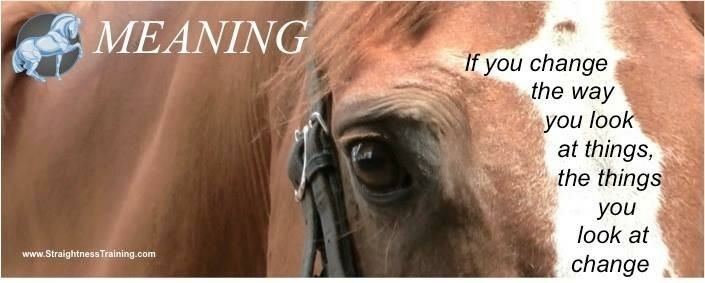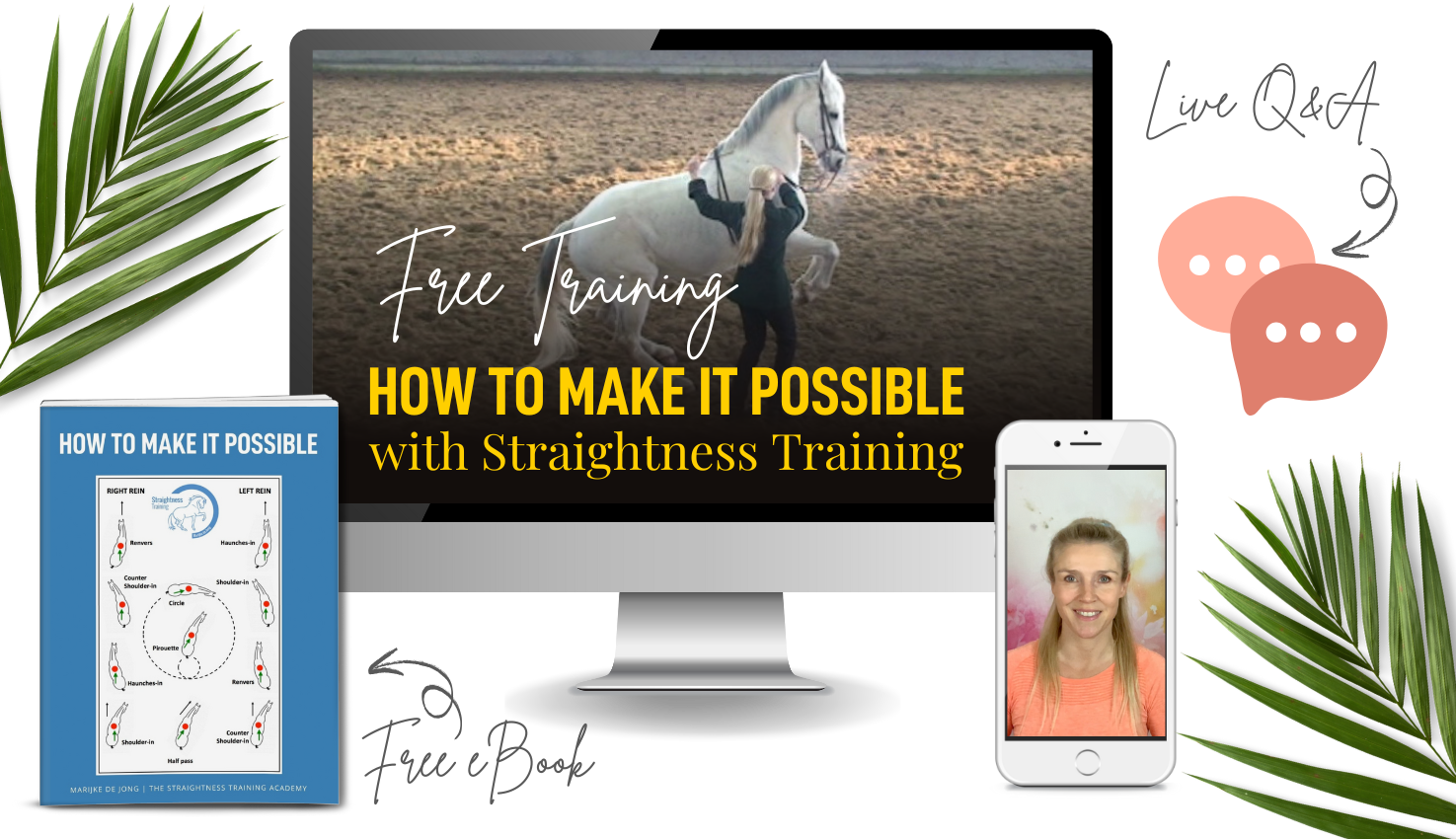- Two women turn 65 years old
- Four-minute mile
- Two men and a terrible war
- 109 year old survivor
- What is a belief?
- What are your beliefs?
- Improve the quality of your beliefs and meanings
- Step 1: Change your vocabulary
- Step 2: Change your focus
- Step 3: Question your beliefs
- Step 4: Create new empowering beliefs
- Step 5: Control what things mean to you
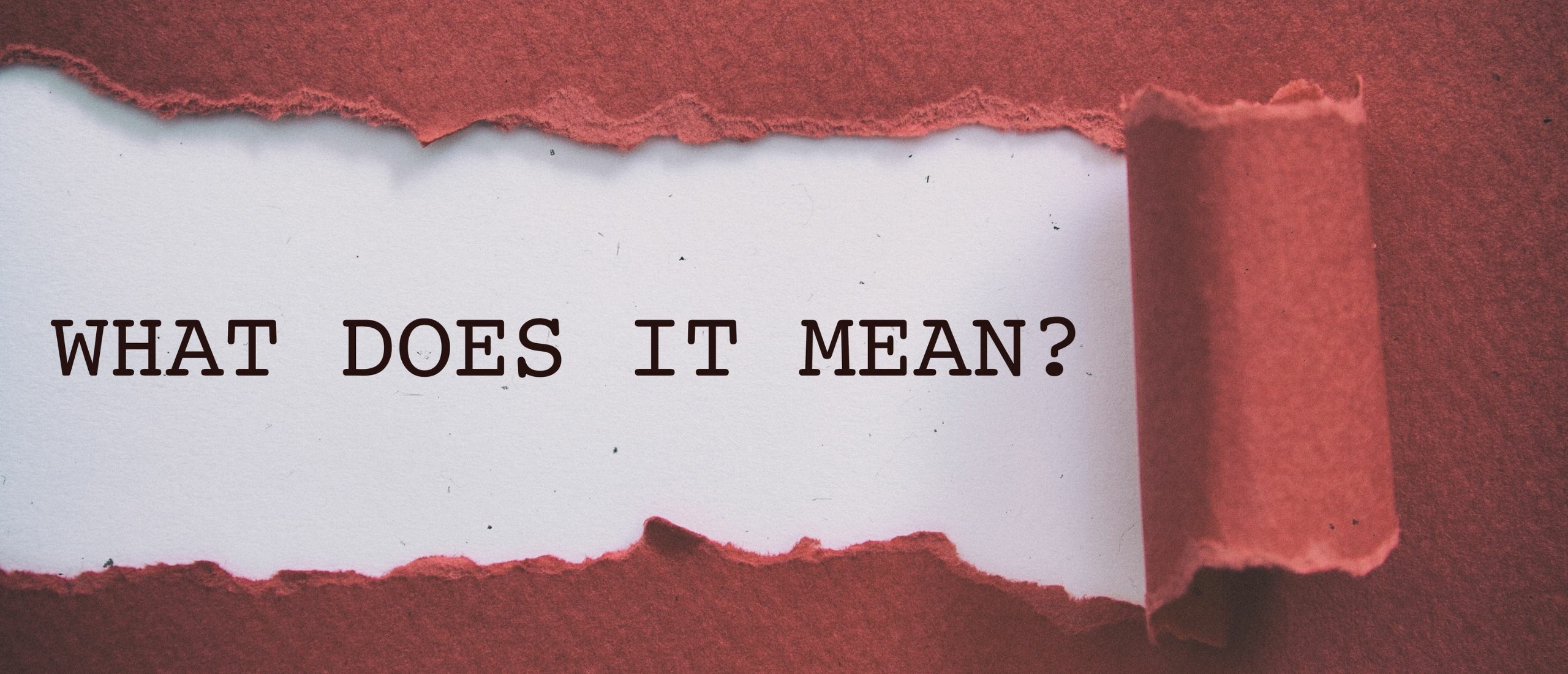
5 Ways to use The Power of Meaning
Often we believe that events control our lives and that our environment and circumstances has shaped who we are today.
But two people can do exactly the same thing, one succeeds the other quits.
For example, two riders start to do Straightness Training:
- They have the same aspirations.
- They have the same sort of ordinary horse.
- They join the same learning program.
- With the same services ands support.
- They’ve got the same opportunities.
- The same challenges.
One is now an instructor, the other just quit.
What’s a key factor?
The Power of Meaning.
It’s not the events of our lives that shape us, but our beliefs as to what those events mean.
Take a look at these examples:
Two women turn 65 years old
Beliefs have the power to see a particular event as the end, but also to see it as a fresh start!
Two women turn 65 years old, yet each takes a different meaning from the event:
- One woman – a horse lover – believes that her life is coming to an end. To her, 65 years of living mean that her body must be breaking down and she’d better start to slow down, so she quits her favorite hobby horse back riding.
- The other woman believes that it’s time for something new. She thinks that mountain climbing might be a good activitiy to begin at the age of 65. For the next 26 years she devotes herself to this new adventure in scaling some of the highest peaks in the world until she was 91. Hulda Crooks (1896 – 1997) has become the oldest woman to scale Mount Whitney and Mount Fuji.
For these 2 women it’s not the age that shapes their behaviour, it’s what they think about their age and what age means to them.
It’s never the events, environment or circumstances, but the meaning we attach to the events, environment and circumstances, and how we interpret them, that shapes our behaviour.
“Live your beliefs and you can turn the world around.” – Henry David Thoreau
Four-minute mile
Beliefs have the power to hold back, but also to break through!
Until 1954 everyone believed that running a mile within four minutes was impossible. They considered this to be physically impossible. When Roger Bannister appeared on the scene he was convinced that he could break through that barrier. And he did! Suddenly many other athletes could to the ‘impossible’ as well and succeeded to run a mile within four minutes while in the meantime the body of the human being had not changed. That barrier was broken because it was a mental barrier, not a physical one.
“If you change the way you look at things, the things you look at change” – Wayne Dyer
Two men and a terrible war
Beliefs have the power to create and the power to destroy!
Two soldiers were shot down in a terrible war and imprisoned. They were isolated and tortured for information. These soldiers were receiving the exact same abuse, but formed different beliefs about their experience:
- One soldier decided that his life was over, and in order to avoid any additional pain, he commited suicide.
- The other soldier thought that there was a reason for this tragedy in his life and he was able to create a meaning out this most painful experience. He feld a deeper belief in himself and thought “Because of this, I will help others and I will make a difference in the world”.
For these 2 veterans it’s not the tragedy that shaped their behaviour, it’s what they thought about their painful experience.
“Human beings have the awesome ability to take any experience of their lives and create a meaning that disempowers them or one that can literally save their lives.” – Tony Robbins
Look at the video about a man who was a paratrooper in the Gulf war. For 15 years doctors told him he would never walk unassisted again. Only one yoga instructor believed in him:
15 years ago he thought it was NOT possible and out of reach, and he was right: Because the doctors believed it was not possible, he was not going to commit much energy and resources to learn to walk again.
Only one yoga instructor believed in him, and therefore he was able to accomplish his goal.
Our beliefs shape our behaviour. We act and perform in accordance with what we belief or what others tells us to believe. But if we have limiting beliefs, we have lack of action and therefore poor results.
So be careful: If you think something is not possible or out of your reach, you’re right!
109 year old survivor
Beliefs have the power to make you optimistic or pessimistic!
Watch this 1 minute video with the 109 year old Holocaust survivor Alice Herz-Sommer. She was in a concentration camp in Terezin, and is still living, feeling good and optimistic:
“The only thing you have absolute control over is yourself and your emotional response to whatever happens in life.” – Tony Robbins
When something bad happens we have the ability to create a meaning about this bad experience. We can let the experience define us and destroy us, or strengthen us.
What is a belief?
A belief is a feeling of certainty about something. Once you believe it’s true, it can become a self-fulfilling prophecy.
There are supportive and limiting beliefs, empowering and dis-empowering beliefs. Beliefs are what cause some riders to succeed, while others not get far. Beliefs are what make the difference between progression and stagnation.
Here are some examples:
LIMITING BELIEFS | EMPOWERING BELIEFS |
Riding is difficult | I see riding as a continuous process of growth and enjoy every step in this process. |
Horses are unpredictable | Horses are mirrors and our teachers |
Everyone else is better | I’m doing the best I can with the resources I have |
Everyone else is progressing faster | It doesn’t matter how slow I go, as long as I don’t quit |
I am not good enough | I am already better than everyone who hasn’t even start Straightness Training yet |
I don’t matter | I can make a difference and turn things around |
He, she, they, the world is out to get me | People are busy with their own improvement, and I’m not the center of the universe |
What if they reject me? | What other people think of me is none of my business. |
I can never succeed because I’m a woman. | Because I am a woman, I have resources available to me that no man could ever dream of! |
I am too old / thick / busy /ill / tired / stressed to be able to ride well, | If I want something, I find a way, if not I find an excuse. |
I can never succeed because my horse is too old / small / big / badly build / lazy / …. | Smooth sees never made a good sailor. |
If I succeed, then my friends won’t like me as much. | It’s okay to shine and to brighten those around me. |
What if I screw up? I might fail, and that would be bad. | There is no such thing as failure. There are only results. |
What if it doesn’t work out? | There’s always a way to turn things around if I’m committed. |
I can’t… I’m too busy / unwell / incapable of handling this… | Impossibility is an opinion, not a fact. What options do I have to handle this situation? |
If I just wait and hope, something will happen. | If I want to change something, I change myself first. |
This is awful and painful. | This, too, shall pass. |
I can’t because I don’t know how. | Everything I need to know will come to me at the right time and place. |
It’s all his / her / their fault this is happening to me. | I am 100% responsible for my own success. |
“It’s just the way I am”…. | No, it’s just the way I think I am! And I can change in a heartbeat! |
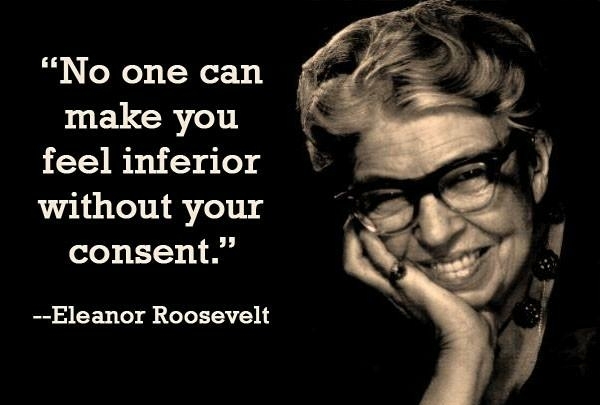
What are your beliefs?
Perhaps you already know by now what your beliefs are, but if it’s difficult for you to find out what your beliefs are, you could answer the following questions:
- People are … / Horses are … / Riders are … / Instructors are … / The horse world is …..
- My favorite phrase in life is … /My favorite phrase about horsemanship is …
- Work is … / Life is …. / Riding is …
- Success is … / Failure is …
- I am … / I am not … / My horse is …. / My horse is not ….
- I love … / I hate …
- I want … / need … / don’t want … / don’t need …
- Others must always /never … / My horse must always/never …
- Most / least important in riding is …
- I can always succeed because …
- I will never be able to …. / My horse will never be able to ….
- If I succeed, then …. / If I am not good enough, then … / If I fail, then ….
- If they love me, then …. / If they reject me, then …
Riders so often develop limiting beliefs about who they are and what they and their horse are capable of. Because they haven’t succeeded in the past, they belief they won’t be able to succeed in the future.
But the past doesn’t equal the future!
And remember: Nothing in life has any meaning except the meaning you give it!
If you change the meaning of an event in your mind, you will change how you feel and what you do.
Improve the quality of your beliefs and meanings
Constantly improving the quality of our beliefs and meanings is very important, because limiting beliefs and meanings will dis-empower us and our horse.
There are lots of limitations in our horsemanship, but most of them exist only in our mind. Sometimes we think in a way which could hold us and our horse back from achieving our goals.
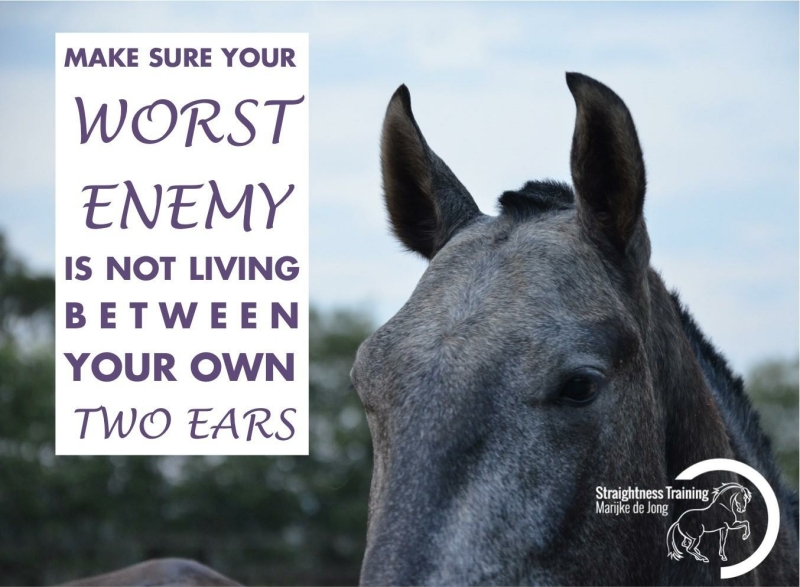
Sometimes our mind is our worst enemy and not other people / the instructor / the horse!
To be the best rider we can be, we should change the beliefs and meanings that are holding us back.
In order to succeed and be happy with our horse, we have to use a set of empowering beliefs and meanings.
We can also improve the quality of our current beliefs and meanings by taking the following steps:
Step 1: Change your vocabulary
“Retirement is not in my vocabulary.” – Betty White
“Losing is not in my vocabulary.” – Ruud van Nistelrooy
- Replace the word ‘problem” with the word ‘challenge” in all your thoughts.
- Exchange the word ‘obstacle’ for ‘opportunity to learn’.
- Don’t use words as ‘Can’t’, ‘Should’, ‘Try’. Just do it!
- Strike ‘Yes, but…’ directly out of your dictionary, do not think in problems.
- Eliminate negative meanings such as ‘wrong’, ‘bad’, ‘failure’, ‘disaster’.
- Never say anything negative about yourself or your horse.
- Use ‘mild’ words for strong emotionsto lower the intensity.
- If you are angry, transform it to ‘a bit annoyed’.
- If you are confused, transform it to ‘I am curious’.
- You are not a failure, you are ‘learning’.
- If you feel frustrated, feel ‘fascinated’.
- Transform ‘I hate’ into ‘I prefer’.
- If you are irritated, transform it to ‘I feel stimulated’ or ‘surprised’.
- If you feel rejected, feel ‘misunderstood’.
- If you think ‘Oh no!!!” , think “A ha, that’s interesting”.
Step 2: Change your focus
“What you see is what you get.”
When you focus on problems, you’ll have more problems. When you focus on possibilities, you’ll have more opportunities.
“I do NOT want my horse to bite/kick/run/flee/rear/buck.”When you think this, there is a great chance it will happen! Because if I ask you “Do NOT think about a pink elephant”, what do you see?
Are you actively looking for all the good and beautiful things in life? If not, change your focus:
- Focus on what you want instead of what you do NOT want with your horse.
- Focus on what you want to create, not on what you want to avoid.
- Focus on your (horse’s) strengths, not your (horse’s) weaknesses.
- Focus on the possibilities for success, not on the potential for failure.
- Focus on your blessings, not your misfortunes.
- Focus on what you can do with your horse, not on excuses.
- Focus on the positive, not on the negative.
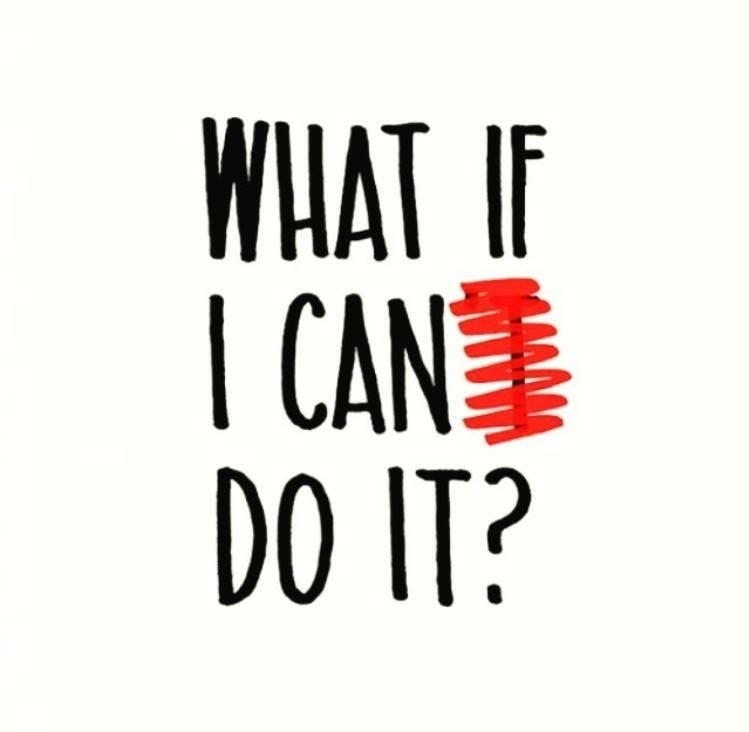
Step 3: Question your beliefs
“Nothing in life has any meaning except the meaning you give it.” – Tony Robbins
It’s all a matter of perspective
- It’s not the situation, it’s our reaction to the situation.
- It’s not the events that shape us, but our beliefs as to what those events mean.
- It’s not what happens to us, but our response to what happens to us that hurts us.
- Sometimes it’s not the pain that makes you suffer, it’s our own negative thought that makes things seem worse.
- It’s not what happens to us, but how we react to it that matters.
- How we think about a problem, what it means to us, is more important than the problem itself.
So ask yourself two very important questions about every limiting belief you have:
1. Is this true?
2. What else could this mean?
Let’s take for example the belief “This is terrible and unbearable.”
- 1. Is this true? –-> No, I am still alive and kicking.
- 2. What else could this mean? –> The truth is, disappointments are not meant to destroy me. They are meant to strengthen me.
Question 2 leads automatically to step 4.
Step 4: Create new empowering beliefs
“The mind is everything. What you think you become.” – Buddha
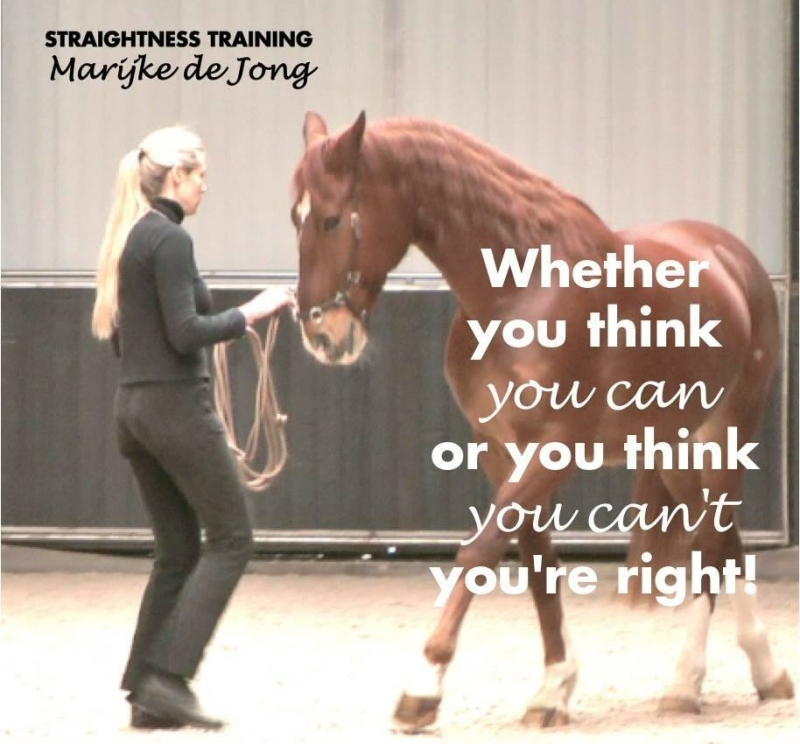
Everything in your life is a reflection of a choice you have made in your mind. If you want a different result, make different choices, choose empowering meanings. You have the choice what to think. The decision is always yours.
We all have the capacity to create meanings that empower us. To create new empowering beliefs, ask yourself:
- What results do I want in my riding and with my horse?
- What would I have to believe, what is necessary to believe, in order to succeed?
- What do I have to believe in order to feel good?
If you want to achieve your goals, create a mindset made of beliefs and meanings that support the truth you want in your future.
Step 5: Control what things mean to you
“Controlling what things mean to you is the ultimate power you possess, and can give you a life of fulfillment.”- Tony Robbins
It is easier to change your state of mind than it is to change your outside life (horse, instructor, other riders).
If you change your state of mind, you will change the experiences you have with your horse. If you change the meaning of an event in your mind, you will change how you feel and what you do.
So control what things mean to you:
- Don’t believe everything you think while working with horses.
- Make sure that your empowering thoughts are much stronger than your limiting thoughts when you train a horse.
- You have power over your mind – not your horse or outside events. Believe this, and you will find strength.
- Always do your best to keep a positive attitude in your horsemanship.
